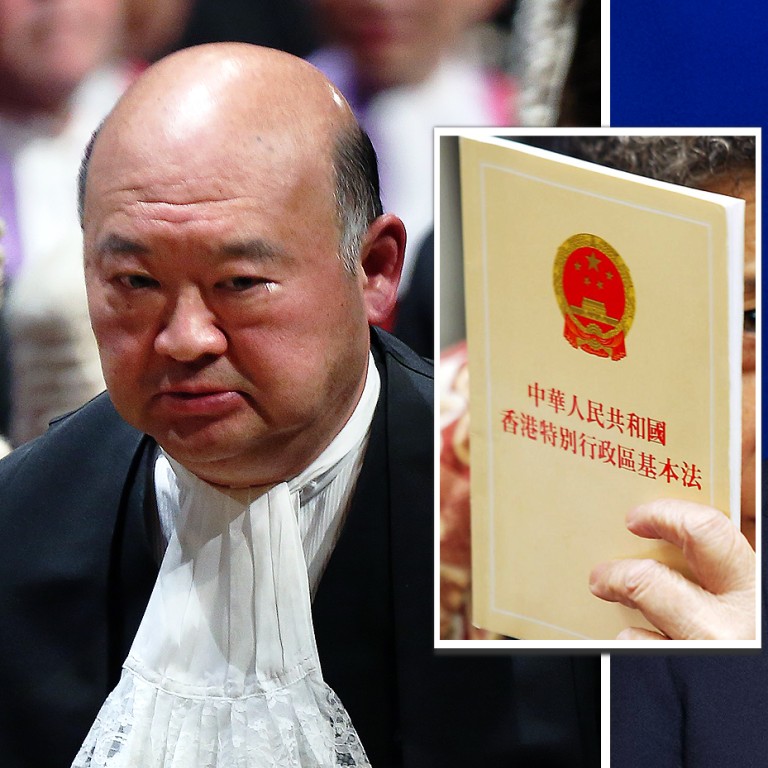
No one is above the law, says Hong Kong’s top judge in surprise rebuke to leader CY Leung's defence of his 'transcendent' position
Hong Kong's top judge yesterday stressed everyone was equal before the law, putting him at odds with Chief Executive Leung Chun-ying, who just hours before defended his status as transcending all three branches of government.
Hong Kong's top judge yesterday stressed everyone was equal before the law, putting him at odds with Chief Executive Leung Chun-ying, who just hours before defended his status as transcending all three branches of government.
Chief Justice Geoffrey Ma Tao-li also emphasised the city enjoyed judicial independence.
Ma was responding to Leung's claim that the status of chief executive "is indeed transcendent" given the fact that the office holder and the principal officials nominated by him were all appointed by Beijing.
READ MORE: Hong Kong 'separation of powers': Why Beijing is laying down the law on who's in charge
It was the second day in a row Leung backed a statement by Beijing's liaison office director Zhang Xiaoming that the city's chief executive was in a "special legal position that transcends" the executive, the legislature and the judiciary.
Zhang - Beijing's top official in the city - also said on Saturday that the concept of separation of powers between the three branches was confined to sovereign states and could only serve as a reference for Hong Kong. His comments alarmed pan-democratic politicians and the Bar Association.

Ma spoke on the concept last year, saying it was set out in the city's mini-constitution.
Yesterday he said he was not going to comment on "things which have recently been said" or on comments about what he had said in the past.
"But I wish to emphasise two points, both in relation to the Basic Law. The first point is judicial independence. This is specified in the Basic Law in three separate places and I would ask people to read Articles 2, 19 and 85," Ma said. "The second point deals with equality before the law, and this is Article 25 … which prescribes that everybody is equal before the law, without exception. This applies to everyone."
READ MORE: Zhang Xiaoming’s controversial speech on Hong Kong governance: The full text
Article 25 says "all Hong Kong residents shall be equal before the law".
Under Article 2, the national legislature authorises Hong Kong "to exercise a high degree of autonomy and enjoy executive, legislative and independent judicial power, including that of final adjudication". Article 19 reiterates Hong Kong "shall be vested with independent judicial power", while Article 85 states local courts "shall exercise judicial power independently, free from any interference".
Ma declined to speak about remarks from Basic Law Committee member and law professor Rao Geping that judges in Hong Kong could have misunderstood the principle.

Earlier yesterday, Leung reiterated the city was not a sovereign state but a special administrative region with all its powers authorised by Beijing.
"The central government would appoint only the chief executive and the principal officials nominated by the chief executive," he said ahead of a visit to Jakarta. "Therefore, the status of chief executive is indeed transcendent."
The Basic Law also stated clearly the head of the executive arm was the chief executive, who would be leader of not only the government but also the SAR, he added. "This logic has been very distinct since the Basic Law was drafted some 20 years ago."
Leung first broke his silence on Tuesday over the dispute surrounding his authority.

One of the latest to weigh in was human rights lawyer Mark Daly, who noted the concept was included in the UN's definition of the rule of law, laid down by the secretary general in 2004.
"Separation of powers is an element under the rule of law," Daly said. "If you detract it from the definition, you are diminishing the rule of law." He also rejected Rao's criticism of the judges, saying he preferred their interpretation of the Basic Law.
Secretary for Justice Rimsky Yuen Kwok-keung sought to allay worries over Zhang's words, saying the chief executive had always been under legislative and judicial scrutiny.
READ MORE: Beijing and Hong Kong ‘must look at Basic Law from each other’s perspective’, justice minister says



